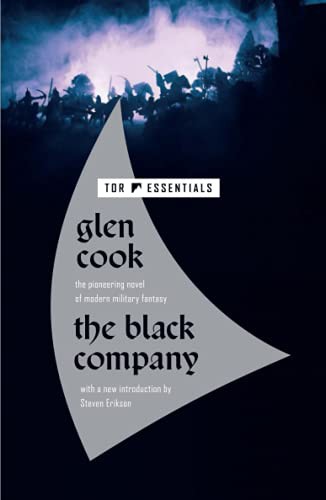Orlion reviewed Black Company by Glen Cook
Review of 'Black Company' on 'Goodreads'
4 stars
In the beginning, science fiction and fantasy were generally distributed from the 'pulp magazines.' It appears as if the Black Company comes from this time. This book is divided into seven chapters, and with the exception of maybe the last one they all have this feeling of being published in serialization. I do not know if this was the case (though I'm fairly confident that Chapter 3 was published in a pulp magazine), but in either case, this is a good example of a transitional work in fantasy. A lot of the conventions we see in modern fantasy are clearly influenced by the writing in this book.
First, is it, as Erikson said once, fantasy brought to the human level? In a sense, it is, but not just in the sense that this story is not about 'the chosen one' and focuses on 'normal people'. It is, first and foremost, a focus on what traditional fantasy would refer to as 'the evil mercenaries' that are generally employed by the forces of evil. Instead of focusing on the struggles of the Rebel groups fighting against the conquering evil, we follow a Company in the employ of that evil against the Rebels (the 'forces of good' in traditional fantasy). Through the Company's labor, we have contact with the Taken (the powerful minions of evil) and even the Lady (the evil itself). Through these contacts we get a sense that no one ever really views themselves as evil, even if their methods are not the best. Often, we get the sense that the Company views the Rebels as being just as despicable as those they are serving.
This leads to some interesting moral quandaries, most of which are under the surface of the narrative. The ending battle particularly muddies the water more with several revelations of what exactly is going on.
And what is going on? Sometimes it is hard to say, we can only rely on what Croaker tells us. He's a commited Annalist of the Black Company, but at least in what we have willfully refuses to record many details. We get his viewpoint, which is limiting even as he is the character who is most likely to give an accurate account of what happened. Records are very important in this world, but are also sources of danger. For example, knowing someone's true name allows you to have control over that person. Recording the truth of the Black Company could, in the end, prove to be their undoing. There is, in other words, a complex dance between being accurate and hiding information that can be used against someone. As near as I can tell, no one ever goes by their actual name.
In conclusion, despite the simple pulp conventions this book harkens to, there is a lot going on. This gives the book a versatility to being read merely as military fiction or to ponder what's hidden beneath the surface.

